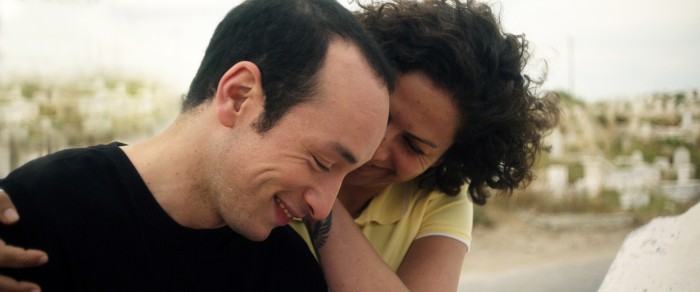The protagonist and namesake of Mohamed Ben Attia’s Hedi certainly isn’t cinema’s first leading man to seek validation from a more free-spirited woman, and it’s awfully unlikely that he’ll be the last. Indeed, the Tunisian filmmaker’s debut effort (which opened the Berlinale competition proper this evening) seems to want not just for western cinematic formula but also some of the western world ideology, too. It’s about two-parts romance, one-part Tunisian national mood piece. It concerns a love affair between an extroverted tour guide and a beta male who has found himself lost in a head-melting job and on the cusp of an arranged marriage. The country’s recent uprising seems to linger in his thoughts. It’s out with the old and in with the new, perhaps.
Incidentally, as Variety reported earlier today, Jean Pierre and Luc Dardenne rescued the film from production hell, finding funding and offering their assistance to the director. The decorated siblings’ names appear prominently in the opening credits and seem to usher in the film’s social-realist feel.
In a blue-collar work setting shot in natural light and handheld camera, we meet Hedi (Majd Mastoura), a 25-year-old sales prospector (or as he denotes: door-to-door salesman) working for a Peugeot dealership somewhere in Northern Tunisia. It seems a dull but decent job, yet the shirt won’t fit. Hedi seems an affable beta male (someone Jack Lemmon might have played in the day) in a very alpha line of work. His shoulders sag from meeting to meeting, and his slim build starkly contrasts with the bulky men with whom he deals. The man’s more interested in drawing comic books, it would seem.
Weighing those shoulders down a touch more is Hedi’s doting, widowed mother, a woman with a rather deft hand for tinkering. As Hedi is consistently reminded, she paid heavily to put him through college and seems to have pulled the required strings to land him a job, too — and, what’s more, she seems to have bagged him an affluent, beautiful bride. But Hedi’s had it. Jaded by his mother’s old-world rituals and traditions (which are treated with grace by Attia and perhaps just the slightest hint of mockery), the young man acts out. When a business trip takes him to a quiet holiday resort in Mahdia, on the country’s east coast, he starts an affair with Rim (Rym Ben Messaoud), one of the hotel’s guides. She’s local, too, it would seem, but her work has allowed her to travel, a fact which Hedi chooses to credit for her extroverted and apparently more contemporary style. Love, of course, soon follows.
This generational and ideological clash simmers quietly beneath the film’s romantic surface and lends to its contemporary tone, perhaps quietly capturing the zeitgeist of modern Tunisia at the same time. In the film’s key scene, Hedi summons the spirit he felt in the days that followed the country’s uprising in 2011. Having not taken part (this is perhaps a sign of his class), Hedi instead recalls the mood of togetherness and mutual affection in the days that followed. There’s little in the film to suggest that that mood has been lost, but Hedi nonetheless still pines for it. Western European affluence is omnipresent in Attia’s film. Peugeot pay the bills and Rim’s resort is custom-built to cater to holidaying Germans. We learn that Hedi’s brother crossed the Mediterranean a long time ago. Hedi seems keen to follow.
Festival Chef Dieter Kosslick has made known that films that deal with refugees and migration would constitute a large chunk of this year’s festival crop. Hedi concerns itself obliquely with that topic and talks about it from a strikingly middle-class perspective. He isn’t want for comfort or safety per se, for his crisis is more existential.
Hedi premiered at the 2016 Berlin International Film Festival and is currently without U.S. distribution.



